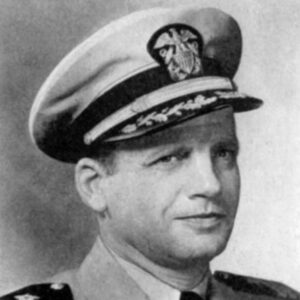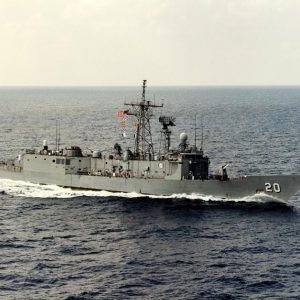calsfoundation@cals.org
Richard Nott Antrim (1907–1969)
Richard Nott Antrim was a career U.S. Navy officer who received a Medal of Honor for saving the life of a fellow prisoner of war held by the Japanese during World War II. He moved to Mountain Home (Baxter County) after retiring and lived there the rest of his life.
Richard Nott Antrim was born in Peru, Indiana, on December 17, 1907, the eldest of two sons and a daughter of the farming family of Nott W. Antrim and Mary Antrim. Richard Antrim entered the U.S. Naval Academy at Annapolis, Maryland, in 1927, graduating on June 4, 1931. He married Jean Packard in Chicago on June 16, 1931, and they had a son and two daughters.
Antrim served on U.S. Navy ships ranging from battleships to destroyers and received naval aviator status to allow him to pilot lighter-than-air airships in 1938. He joined the crew of the destroyer USS Pope as executive officer in December 1939 and was serving in that role when the United States entered World War II. During the February 4, 1942, Battle of Makassar Strait, the Pope, serving with a makeshift fleet of U.S., Dutch, British, and Australian warships, sailed close to the shore to fire on the Japanese to delay their landings at Balikpapan. Antrim’s commander, Welford C. Blinn, praised his executive officer’s “meritorious performance of his several duties before and throughout the action,” recommending Antrim for a “decoration deemed appropriate.” Antrim later received the Navy Cross for his actions in that fight.
Following the Battle of the Java Sea, the Pope joined a British heavy cruiser and destroyer trying to escape the Japanese navy as it surrounded Java. The ships were spotted on March 1, and the two Royal Navy ships were sunk, while the Pope, having fired all of its torpedoes and 140 salvoes from its guns, slipped away in a rain squall. It was soon spotted by Japanese planes, however, and was sunk after being attacked by twelve dive bombers. All but one American sailor escaped the ship, and Antrim, wounded, gathered all of the life rafts around his whaleboat, keeping the crew together. The sailors were picked up by a Japanese warship three days later and taken to a prisoner-of-war camp at Makassar in the Celebes.
In April 1942, a Japanese guard began brutally clubbing an American officer in the camp. Antrim approached the guard and persuaded him to explain the charges against the stricken officer. As 2,700 Allied prisoners gathered around, he offered to take the remainder of the man’s beating, “throwing the Japanese completely off balance in their amazement and eliciting roars of approval from the suddenly inspired allied prisoners.” His Medal of Honor citation states that “by his fearless leadership and valiant concern for the welfare of another, he not only saved the life of a fellow officer and stunned the Japanese into sparing his own life but also brought about a new respect for American officers and men and a great improvement in camp living conditions.” Antrim later took charge of a labor detail digging slit trenches for protection from Allied bombers and instructed his men to dig them in a pattern that would appear as a giant “U.S.” from the air, keeping the bombers for attacking the camp. Freed after the war, Antrim received the Medal of Honor, as well as a Bronze Star for his trench idea, from President Harry Truman at the White House on January 30, 1947.
Antrim retired as a rear admiral on April 1, 1954, and settled in Mountain Home. As a Medal of Honor winner, he was frequently asked to speak at patriotic events, and during a Veterans Day speech at the Arkansas State Capitol in 1967, he urged his fellow veterans to fight poverty, crime, and violence, saying that the United States “has crossed a threshold of a broad social revolution, the aim of which is, in part, the elimination of poverty and prejudice.” This, he said, would lead to “a golden era of America.” Antrim died on March 7, 1969, and is buried in Arlington National Cemetery.
On March 27, 1979, the guided-missile frigate USS Antrim, named in his honor, was launched, and the late admiral’s widow christened the vessel. The ship served the United States for more than fourteen years before being struck from the navy list on September 4, 1997. It was transferred to the Turkish navy on August 27, 1998, where it served as the TCG Giresun.
For additional information:
“Antrim II.” Dictionary of American Fighting Ships. Naval History and Heritage Command. https://www.history.navy.mil/research/histories/ship-histories/danfs/a/antrim-ii.html (accessed July 12, 2018).
Medal of Honor Recipients 1863–1978, Prepared for the Committee on Veterans Affairs United States Senate, February 14, 1979. Washington DC: Government Printing Office, 1979.
“Medal Winner in POW Camp Dies at Age 61.” Arkansas Gazette, March 8, 1969, p. 8B.
“Peaceful Change, But Not Rebellion, Urged by Admiral.” Arkansas Gazette, November 12, 1967, pp. 1A, 2A.
“USS Antrim (FFG-20).” NavSource.com. http://www.navsource.org/archives/07/0720.htm (accessed July 12, 2018).
Mark K. Christ
Little Rock, Arkansas
 Military
Military World War II through the Faubus Era, 1941 through 1967
World War II through the Faubus Era, 1941 through 1967 Richard Nott Antrim
Richard Nott Antrim  USS Antrim
USS Antrim 




Comments
No comments on this entry yet.